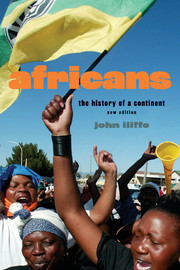Book contents
- Frontmatter
- Contents
- List of maps
- Preface to the second edition
- Africans
- 1 The frontiersmen of mankind
- 2 The emergence of food-producing communities
- 3 The impact of metals
- 4 Christianity and Islam
- 5 Colonising society in western Africa
- 6 Colonising society in eastern and southern Africa
- 7 The Atlantic slave trade
- 8 Regional diversity in the nineteenth century
- 9 Colonial invasion
- 10 Colonial change, 1918–1950
- 11 Independent Africa, 1950–1980
- 12 Industrialisation and race in South Africa, 1886–1994
- 13 In the time of AIDS
- Notes
- Further reading
- Index
- Books in the series
1 - The frontiersmen of mankind
- Frontmatter
- Contents
- List of maps
- Preface to the second edition
- Africans
- 1 The frontiersmen of mankind
- 2 The emergence of food-producing communities
- 3 The impact of metals
- 4 Christianity and Islam
- 5 Colonising society in western Africa
- 6 Colonising society in eastern and southern Africa
- 7 The Atlantic slave trade
- 8 Regional diversity in the nineteenth century
- 9 Colonial invasion
- 10 Colonial change, 1918–1950
- 11 Independent Africa, 1950–1980
- 12 Industrialisation and race in South Africa, 1886–1994
- 13 In the time of AIDS
- Notes
- Further reading
- Index
- Books in the series
Summary
the liberation of their continent made the second half of the twentieth century a triumphant period for the peoples of Africa, but at the end of the century triumph turned to disillusionment with the fruits of independence. This juncture is a time for understanding, for reflection on the place of contemporary problems in the continent's long history. That is the purpose of this book. It is a general history of Africa from the origins of mankind to the present, but it is written with the contemporary situation in mind. That explains its organising theme.
Africans have been and are the frontiersmen who have colonised an especially hostile region of the world on behalf of the entire human race. That has been their chief contribution to history. It is why they deserve admiration, support, and careful study. The central themes of African history are the peopling of the continent, the achievement of human coexistence with nature, the building up of enduring societies, and their defence against aggression from more favoured regions. As a Malawian proverb says, ‘It is people who make the world; the bush has wounds and scars.’ At the heart of the African past, therefore, has been a unique population history that links the earliest human beings to their living descendants in a single story. That is the subject of this book.
- Type
- Chapter
- Information
- AfricansThe History of a Continent, pp. 1 - 5Publisher: Cambridge University PressPrint publication year: 2007

